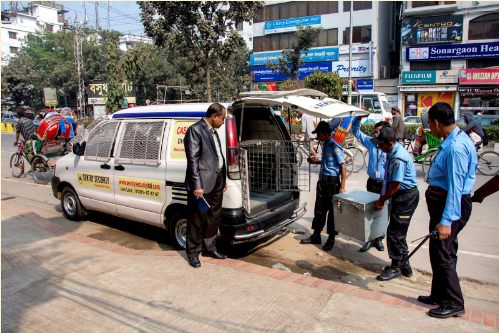It’s true that there can be lots of risks of cash in transit. This holds true both at the physical location of the firm and when money is in transit. Thefts of large amounts of cash are also common news items.
Here comes the brilliant option of smart safes.
Although many corporate and money transactions are now conducted electronically, cash is still widely used for retail purchases made in person. In order to do business, cash must be physically transported.
There is a significant security risk involved with carrying cash. Hence, it is necessary to use Cash-in-Transit (CIT) services.
Risks of Cash in Transit , When CiT functions appropriately, a merchant may arrange for an armored vehicle to pick up and deposit cash in a bank account.
However, if there is a holdup at any stage, it might affect the retail business’s productivity and revenue. That’s why so many stores are investing in CIT-optimized smart safes.
Quick Overview
ToggleRisks of Cash in Transit With Smart Safes With Smart Safes
When it comes to moving money around, more and more companies and banks are using cash-in-transit (CIT) services.
Currency in Transit, or Risks Of Cash In Transit is the safe transfer of cash and other valuable assets together with other forms of legal tender.
This essential service makes the smooth exchange of money and other assets between consumers, companies, and banks possible.
CIT is crucial to the financial industry’s success since it facilitates the transfer of money and other assets with little loss or theft.
CIT services come in a variety of flavors. Each one adapted to the particulars of its clientele and the commodities they’re moving.
Such things may include:
- Transporting huge sums of cash or other high-value assets requires armored vehicles driven by experienced and armed people and outfitted with the latest security technology.
- When moving lesser amounts of cash or sensitive documents, a trusted and efficient option is to use a safe courier service. In order to keep a low profile, these services often employ the use of unmarked cars and inconspicuous people.
- Some CIT providers also provide services for end-to-end cash asset management, including counting, processing, and vault storage.
Potential Risks Of Cash In Transit
Safe and effective movement of funds and other valuables necessitates carefully managing risks and obstacles unique to CIT operations.
Theft, robbery, and hijacking of cars are common Risks Of Cash In Transit as are incidents and human error that cause property damage or loss. CIT operations may also need to be improved by logistical hurdles, including finding efficient ways to deal with traffic and meeting tight deadlines.
CIT providers may provide the most significant degree of security by detecting possible vulnerabilities and threats and then implementing tailored ways to manage those risks. Possible solutions include rerouting traffic, tightening security, or investing in staff training.
Thievery may be reduced, and up-to-the-minute details regarding the whereabouts and condition of carried goods are made available via the use of tracking and monitoring systems. Risks of Cash in Transit .This category includes:
- Smart Safes
- Alarms
- GPS trackers
- Surveillance cameras
For the sake of CITs and enterprises alike, smart safes were developed.
Smart safes’ digital management features drive change in the cash-in-transit (CIT) industry.
Thanks to smart safes, businesses now have a centralized way to track and manage their cash. This dramatically reduces the potential for theft and loss that is connected with using hard currency.
Smart Safes: The Future of Cash Management
Smart safes are cash-handling equipment that helps businesses keep their money safe and organized. In addition to automatically counting and sorting currency, these devices can spot fake bills and have built-in reporting systems.
Smart safes may be linked to other systems like point-of-sale (POS) terminals to further automate cash processing.
Keeping money safe until it gets collected by a security vehicle service is the main purpose of a smart safe. Because of this, not only is the possibility of burglary and theft diminished, but also the possibility of human mistake and discrepancy in the handling of currency by staff.
In addition to freeing up staff time for other valuable pursuits, such as customer service, smart safes may improve security by preventing unauthorized access to cash.
Smart Safes VS. Regular Safes
The standard safe’s only purpose is to secure money. They provide a safe place for store owners to store cash after business hours, preventing loss due to theft or fire. These commercial safes don’t have any extra features or protections save the standard ones.
A cash safe that uses cutting-edge technology to boost efficiency and security. The cash in these safes may be counted, tracked, monitored, and managed without ever leaving the device.
The smart safes can easily track the amount of money inside the safe, exactly how much more has to be put, and how much spare change is available after each deposit. The time, date, user, and reason for each access are all recorded by a smart safe.
Why Use Smart Safes: Top 5 Benefits
In recent years, the use of smart safes has exploded. Superior security, efficiency, and traceability are just a few of their numerous advantages over traditional safes. Money management stress may also be alleviated by using a smart safe for a company.
1. Protection
A smart safe can protect cash and track transactions in a business’s cash management system. Conventional lock box cash-counting safes link to your POS terminal, internet banking, or other company infrastructure to authenticate and track your cash.
2. Simplicity
However, high-tech safes may simplify managing your cash even more.
Smart safe innovations allow you to:
- keep track of available funds
- schedule deposit pickups
- continuous coin delivery through armored trucks
- limit the danger of theft
Smart safe makes it all happen while minimizing the need for impromptu or frequent excursions to the bank.
3. Convenient
Smart safes also have the unique capacity to provide temporary credit to financial institutions. Thanks to this function, stores may be paid in advance of when their cash deposits are actually picked up and taken to the bank.
This is particularly useful for stores that need access to funds quickly to cover expenses like payroll or stock up on essentials.
The smart safe’s provisional credit function is enabled by electronically capturing cash deposits and transmitting that data to the retailer’s bank. The amount of the deposits is then provisionally credited to the store’s account by the bank.
Once the cash has been physically received by the armed transport firm and handed to the bank, the credit will be applied within 24 to 48 hours.
4. Fewer Mistakes
Retailers who want better control over their cash flow may find the temporary credit offered by many banks for smart vault deposits appealing. Smart safes’ computerized logging of deposits also helps cut down on mistakes and inconsistencies. This process simplifies the cash management procedure even further.
5. Flexibility
Smart safes’ capacity to provide temporary bank credit is a useful feature that may help merchants manage their cash flow more effectively and increase their operational margins.
This function allows stores to satisfy their urgent cash demands by being credited for deposits made before the monies are actually transferred to the bank.
7 Benefits of Reducing Risks Of Cash In Transit With Smart Safes
1. Reduce the transportation of cash
Cash pickup and delivery fees may quickly pile up. Smart safes decrease CiT pickups since they alert the retailer’s bank of cash deposits and safely store the money until it is collected. Customers’ accounts are credited with money before it is actually placed. It saves them the trouble of making daily deposits.
Keeping the cash on-site and combining many days’ deposits into one pickup is secure since smart safes are insurance-rated storage devices. A reduction in the regularity of cash delivery is another benefit of having a safe place to store cash for use at registers and as change.
2. Money is safer now than ever before
Cash automation technologies lessen the risk of theft and loss. The safe provides a secured and insured storage space for cash. Smart safes protect cash against theft by keeping it hidden and reducing the amount of times it is counted and handled by hand. Cash automation systems restrict cash access to only authorized personnel to ensure that cash transactions are transparent and accountable.
3. Quicken the availability of working capital
High-tech safes and currency recycles log every single transaction digitally. Before the money is deposited to the bank, the merchant is given credit for the amount based on the information provided in the deposit report.
Credited money may be used immediately by retailers for working capital, eliminating the need for them to wait for finance bank deposits.
4. Real-time access to financial data
Retailers can remotely monitor cash via real-time reporting thanks to the connectivity of smart safes and recycling companies, which may be linked to a network. Data is sent from the devices after each transaction, giving users access to secure, up-to-the-minute information.
Smart safes further simplify cash balance and reconciling. Loss prevention agents are notified quickly of any unusual behavior or discrepancies that cannot be explained.
5. Defend against phony products and theft
Electronic safes can detect fake money and coins as soon as they are placed inside. Loss prevention agents will be informed if any red flags are found throughout the verification procedure. Smart safes prevent employee theft by being impossible to get into and keeping a full audit record of all transactions.
6. Lower Bank Service Charges
Usually, bank charges for:
- Managing a retailer’s commercial bank account
- Deposits,
- Changes in fund composition,
- Sweeps
- Insufficient funds (NSF).
All of the costs can be drastically reduced by installing a smart safe. These costs may mount up fast for merchants that deal with many banks.
Customers may streamline their banking interactions by connecting all of a customer’s safe activities to a single bank via their Cash in Transit Provider. Daily credit also eliminates the need for merchants to make regular bank runs, saving them a ton of money on deposit costs.
7. Increased Accountability and Transparency with Cash
Network connection in smart safes provides dashboard-like access to the full safe estate, note validation, cash monitoring and accountability, extensive reporting capabilities, and more. This kind of access enables unparalleled cash visibility for a merchant with several locations.
Each user of a smart safe is given a unique user PIN, making it possible to track and audit all transactions made in the safe down to the individual level. With this much detail recorded, the store’s cash transactions and the company as a whole may be held more accountable.
Considering these merits, it is not surprising smart safes are rapidly changing the customary dynamic between CIT and businesses.
Finally | Risks of Cash in Transit
Undoubtedly, smart safes have minimized the risks of cash in transit, but some facts also exist. The price of the equipment and its upkeep is a major issue of concern.
Maintenance and servicing fees should also be considered when budgeting for a smart safe. Moreover, personnel need to be trained on how to use the machines properly, which may be a strain for stores that are already trying to teach staff a variety of other jobs.
Despite certain concerns, smart safes are gaining popularity in a wide range of commercial establishments, Risks of Cash in Transit including grocery shops, restaurants, and quick-service eateries. Theft and robbery are more common at these places because of the massive quantities of cash they handle.


